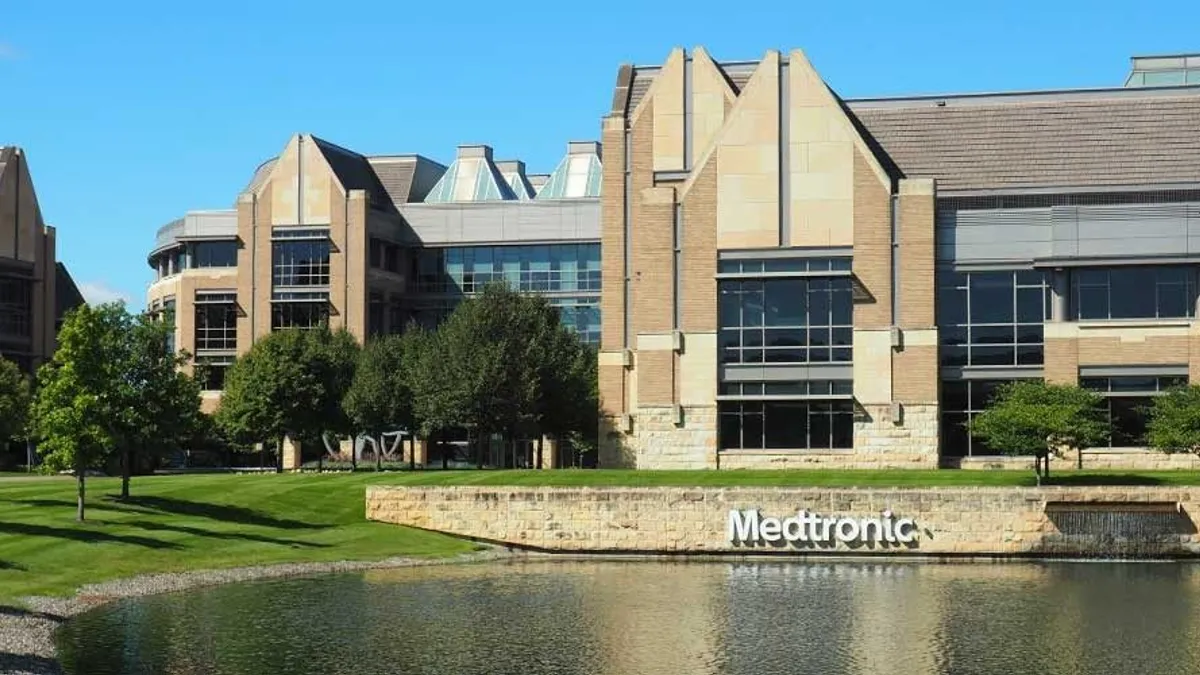Dive Brief:
- Medtronic announced Friday that Blackstone Life Sciences has agreed to provide up to $337 million in funding to its diabetes portfolio, marking the segment of the private equity firm's first investment in the medical device sector.
- Separately, the medtech giant unveiled results from a U.S. pivotal study of its MiniMed 780G closed loop insulin pump system that met endpoints for safety and glycemic control when compared with an earlier version of the technology, paving the way for a future premarket approval application to FDA, the company said.
- A second clinical trial of the 780G device in New Zealand, in a more challenging patient group with less-controlled diabetes and children as young as seven years of age, also met primary endpoints for time in range, according to data presented. All three announcements were made in conjunction with the American Diabetes Association's 80th Scientific sessions, held virtually.
Dive Insight
Medtronic is aiming to reinvigorate growth in its diabetes division, which saw revenue slump 9% in the quarter ended in April, perhaps in part because patients were staying away from the doctor's office while COVID-19 was spreading rapidly, hobbling sales of insulin pumps.
"We have some work to do to get this business back to growth, and we're certainly committed to returning ourselves to very strong growth," Medtronic Diabetes Group President Sean Salmon said during an investor meeting held Friday.
Central to its strategy is the 780G advanced hybrid closed loop system, which features an algorithm with the ability to set a lower glucose target of 100 mg/dl, and automatic corrections of insulin every five minutes as needed to simplify meal handling. The device received a CE mark, the company announced last week, and is expected to begin shipping in some European countries this fall.
The Blackstone deal calls for the massive private equity firm to provide up to $337 million in funding over the next several years to accelerate four programs in Medtronic's insulin pump and continuous glucose monitoring pipeline. Blackstone will receive royalties for a percentage of sales if the technologies are successfully commercialized, Medtronic said, without specifying the projects being funded.
In Medtronic's U.S. pivotal study, patients ranging in age from 14 to 75 years had an average A1c level of 7%. The overall time in range was 75%, with overall time below range of 1.8%. The auto-correction feature contributed to 22% of all bolus insulin. There were no severe instances of hypoglycemia or diabetic ketoacidosis.
Medtronic is looking to compete with players like Tandem, whose Control-IQ closed loop algorithm obtained De Novo authorization from FDA as the first interoperable automated glycemic controller at the end of 2019. UBS analysts called Medtronic's results on patient satisfaction and auto-corrections encouraging, but said in a note to clients Monday their thesis that Tandem is a better product remains unchanged, calling it "the best on-market closed loop system."
Medtronic expects to make its FDA submission for the 780G system this summer. More imminently, it's expecting FDA approval this summer for the MiniMed 770G device that uses the same hybrid closed loop technology as the 670G system.
The company on Saturday also released study results on an extended wear infusion set indicating the platform is safe and effective for up to seven days, compared to three days for Medtronic's standard infusion set. The technology facilitates the delivery of insulin under the skin to pump users. The extended infusion set has received a CE mark and is being studied in a U.S. pivotal trial.










